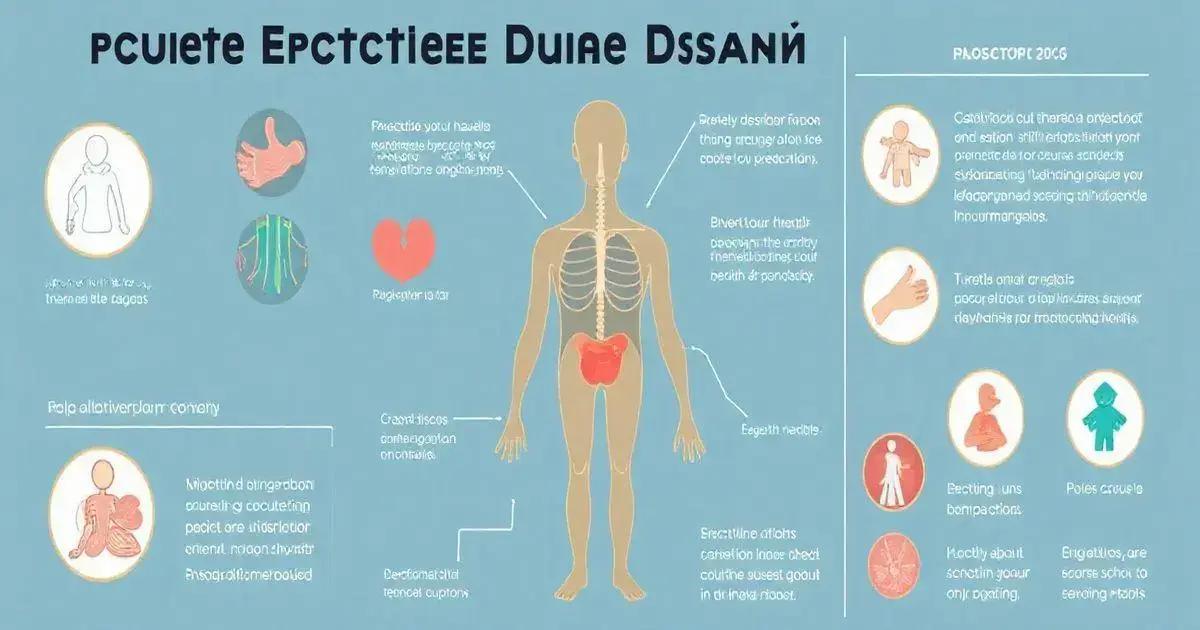Erectile dysfunction (ED) can indicate other health issues, such as cardiovascular disease and diabetes. If you experience ED, it’s crucial to consult a healthcare professional for proper diagnosis and treatment options, which may include lifestyle changes, medications, or counseling to improve both sexual and overall health.
Erectile dysfunction (ED) is often viewed as a personal issue, but it can be a signal of broader health problems. For many men, experiencing ED may point to underlying conditions such as cardiovascular disease, diabetes, or stress-related disorders. In this article, we will explore the connections between ED and overall health, examining common health issues linked to dysfunction and how ED can serve as an important warning sign. Additionally, we’ll discuss the steps men should take if they begin experiencing these symptoms and the importance of consulting a healthcare professional.
Understanding Erectile Dysfunction

Erectile dysfunction (ED) is the inability to achieve or maintain an erection sufficient for satisfactory sexual performance. This condition can affect men of all ages but is more common in older adults. Understanding the causes and implications of ED is crucial for maintaining overall health.
What Causes Erectile Dysfunction?
Various factors can contribute to ED, including physical and psychological issues. Physical causes may include:
- Heart disease
- Diabetes
- Obesity
- High blood pressure
- Hormonal imbalances
On the other hand, psychological factors can also play a significant role. Anxiety, depression, and relationship problems may lead to or exacerbate erectile dysfunction.
Signs and Symptoms
The primary symptom of ED is the persistent difficulty in getting or keeping an erection. Other related symptoms might include:
- Reduced sexual desire
- Difficulty achieving orgasm
- Stress or anxiety during sexual activities
It’s important to note that occasional difficulties with erections are normal, but ongoing issues could indicate a need for medical attention.
Diagnosing Erectile Dysfunction
To diagnose ED, healthcare professionals typically conduct a thorough physical examination and review medical history. They may also perform blood tests to check for conditions such as diabetes or hormonal imbalances. Psychological assessments may be included to evaluate emotional and mental health aspects.
ED and Overall Health
Understanding erectile dysfunction is crucial because it often reflects broader health concerns. Conditions like heart disease and diabetes can lead to ED, and erectile dysfunction may signal the need for a comprehensive evaluation of one’s health. Addressing these factors early can significantly enhance quality of life.
Common Health Issues Linked to ED

Several health issues are closely linked to erectile dysfunction (ED). Recognizing these connections is vital for early diagnosis and intervention. Below are some of the most common health problems associated with ED:
1. Cardiovascular Disease
ED can often be an early warning sign of cardiovascular problems. Issues such as high blood pressure, high cholesterol, and clogged arteries can impede blood flow, which is essential for achieving an erection. Men experiencing ED should consider getting a heart health screening.
2. Diabetes
Men with diabetes are at a higher risk of developing ED. This is due to damage to blood vessels and nerves caused by prolonged high blood sugar levels. Good management of diabetes can reduce the risk of developing erectile dysfunction.
3. Obesity
Obesity can lead to hormonal imbalances and decreased blood flow, both of which contribute to ED. Maintaining a healthy weight through diet and exercise is crucial for reducing the likelihood of experiencing erectile dysfunction.
4. Hormonal Imbalances
Testosterone plays a significant role in sexual function. Low levels of this hormone can lead to reduced sexual desire and erectile dysfunction. Hormonal tests can help identify any imbalances that may need treatment.
5. Mental Health Issues
Psychological factors, including depression and anxiety, can significantly impact sexual health. Stress and emotional problems can interfere with the body’s ability to function during sexual activity. Treatment for mental health issues can often improve erectile function.
In summary, understanding these common health issues linked to ED not only helps in addressing the condition itself but also encourages a more comprehensive approach to overall health management.
How ED Can Be a Warning Sign

Erectile dysfunction (ED) should not be viewed as a standalone issue. Instead, it can serve as a warning sign for more serious underlying health problems. Here are some ways ED acts as an indicator of your overall health:
1. Early Warning for Cardiovascular Disease
ED often precedes cardiovascular issues. If blood flow is restricted due to heart disease or clogged arteries, this can manifest as difficulty achieving an erection. It is crucial to seek medical attention if ED occurs, as it may lead to early diagnosis and better outcomes for heart health.
2. Indicator of Diabetes
Men who experience erectile dysfunction may be at risk for diabetes, especially type 2 diabetes. Blood sugar levels that are too high can damage nerves and blood vessels, leading to issues with sexual performance. Recognizing ED could prompt a check for diabetes.
3. Connection to Hormonal Issues
Low testosterone levels can significantly affect sexual function. If ED is present, it may indicate hormonal imbalances that require evaluation. Identifying and treating these imbalances can lead to overall health improvements.
4. Psychological Implications
ED can often stem from psychological conditions like anxiety and depression. In these cases, ED may signal a need to address mental health issues. Recognizing this connection encourages individuals to seek help, which can improve both mental and sexual health.
5. Lifestyle Factors
Factors such as obesity, smoking, and lack of exercise can lead to erectile dysfunction. If someone experiences ED, it could serve as a nudge to reassess lifestyle choices that affect overall well-being. Making healthier choices can significantly enhance both sexual function and general health.
Thus, recognizing erectile dysfunction as a warning sign is essential. It emphasizes the importance of addressing not just the symptoms but the underlying health concerns it may reveal.
Steps to Take If You Experience ED

If you experience erectile dysfunction (ED), taking proactive steps is essential for addressing the issue and improving your health. Here are important steps to consider:
1. Acknowledge the Issue
Recognizing that ED is a common condition affecting many men is the first step. It’s important to understand that you’re not alone and that help is available.
2. Reflect on Possible Causes
Take note of any lifestyle factors that may contribute to your ED, such as:
- Stress
- Lack of exercise
- Poor diet
- Excessive alcohol consumption
- Smoking
This reflection can help direct your conversation with a healthcare provider.
3. Consult a Healthcare Professional
Scheduling an appointment with a doctor is vital. A healthcare provider can evaluate your symptoms, conduct necessary tests, and discuss potential treatments. They may explore:
- Medical history
- Physical examinations
- Lab tests to check hormone levels or blood sugar
4. Discuss Treatment Options
There are various treatment options available, such as:
- Oral medications (like Viagra or Cialis)
- Counseling for psychological factors
- Pumps or implants
- Lifestyle changes, including exercise and diet
5. Make Lifestyle Changes
Improving your overall health can positively impact erectile function. Consider:
- Eating a balanced diet rich in fruits and vegetables
- Regular exercise
- Managing stress through techniques like meditation or yoga
- Limiting alcohol and quitting smoking
By taking these steps, you can address ED effectively and work towards improving your sexual health.
Consulting a Healthcare Professional

Consulting a healthcare professional is an essential step if you experience erectile dysfunction (ED). Many men may feel embarrassed or hesitant to seek help, but professional guidance can provide valuable insights and options. Here are important aspects to consider when discussing ED with your doctor:
1. Be Open and Honest
It is important to provide accurate information about your symptoms and any related health issues. Discuss how long you have been experiencing ED, any noticeable changes in your sexual function, and how it affects your life.
2. Review Your Medical History
Your doctor will likely ask questions about your medical history, including:
- Existing health conditions (such as diabetes, heart disease, or hormonal problems)
- Medications you are taking that may affect sexual function
- Family health history, particularly regarding heart disease and diabetes
3. Undergo Necessary Tests
Your doctor may recommend tests to identify the cause of your ED. Common tests may include:
- Blood tests to check hormone levels, blood sugar, and cholesterol
- Urinalysis
- Psychological evaluations to assess mental health
4. Discuss Treatment Options
Once a diagnosis is made, your healthcare provider will discuss various treatment options, which may include:
- Medications such as PDE5 inhibitors (like Viagra or Cialis)
- Counseling for psychological issues
- Alternative methods, like vacuum devices or penile implants
5. Follow-Up Appointments
Plan for follow-up visits to monitor your progress and adjust treatments as needed. Ongoing communication with your healthcare provider is vital to ensure effective management of ED.
Taking the step to consult a healthcare professional can lead to insights that enhance not only sexual health but overall well-being. Don’t hesitate to seek the help you need.
Understanding the Implications of Erectile Dysfunction
Erectile dysfunction (ED) is more than just a personal concern; it can serve as a vital signal of overall health issues that require attention. By recognizing the potential connections between ED and conditions such as cardiovascular disease, diabetes, and mental health disorders, individuals can take proactive steps toward better well-being.
Consulting a healthcare professional is crucial for diagnosing the underlying causes of ED and exploring effective treatment options. With the right approach, men can address this condition responsibly and regain control over their sexual health.
Ultimately, understanding and managing ED can lead to improvements not only in sexual function but also in overall quality of life.
FAQ – Frequently Asked Questions About Erectile Dysfunction
What is erectile dysfunction (ED)?
Erectile dysfunction (ED) is the inability to achieve or maintain an erection sufficient for satisfactory sexual performance.
What common health issues are linked to ED?
Common health issues linked to ED include cardiovascular disease, diabetes, hormonal imbalances, obesity, and mental health conditions.
How can ED be a warning sign for other conditions?
ED can indicate underlying health problems such as heart disease or diabetes, making it important to consult a healthcare professional for evaluation.
What steps should I take if I experience ED?
Acknowledge the issue, reflect on lifestyle factors, consult a healthcare professional, discuss treatment options, and make necessary lifestyle changes.
Why is it important to consult a healthcare professional?
Consulting a healthcare professional allows for a proper diagnosis, exploration of treatment options, and management of any underlying health conditions.
What treatment options are available for ED?
Treatment options for ED include oral medications, counseling, lifestyle changes, vacuum devices, and penile implants.












